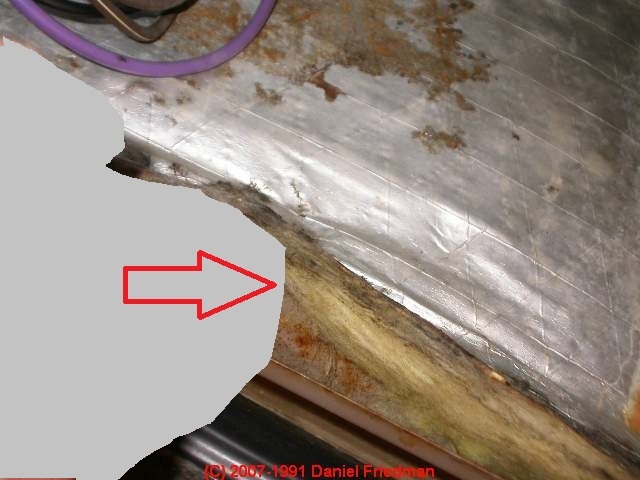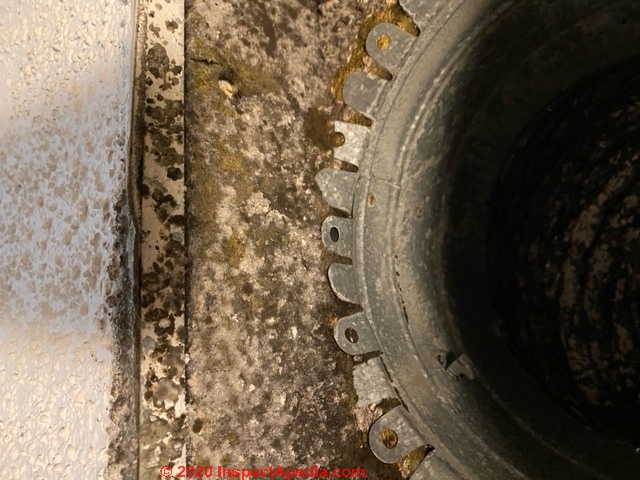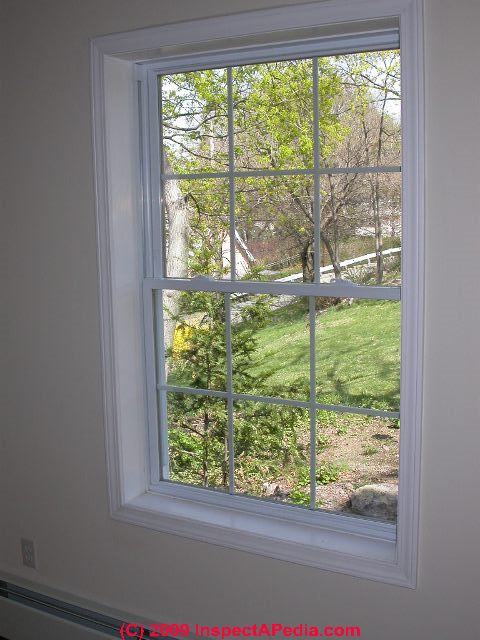 Aluminum Odor Complaints at Buildings
Aluminum Odor Complaints at Buildings
Does Aluminum give off Odors in or at Buildings?
- POST a QUESTION or COMMENT on how to find and cure sources of aluminum building component or HVAC component odors at or in buildings
How to find & cure odors that are suspected to come from aluminum building materials or HVAC system components.
This article series discusses common odor sources, including indoor metallic or plastic odors or chemical smells observed at some installations of vinyl exterior building siding or in other plastic or vinyl building products such as windows and trim.
We provide links to articles detailing possible health effects of exposure to indoor VOCs and plastic odors and smells.
InspectAPedia tolerates no conflicts of interest. We have no relationship with advertisers, products, or services discussed at this website.
- Daniel Friedman, Publisher/Editor/Author - See WHO ARE WE?
Guide to Aluminum-Related Odors In Buildings
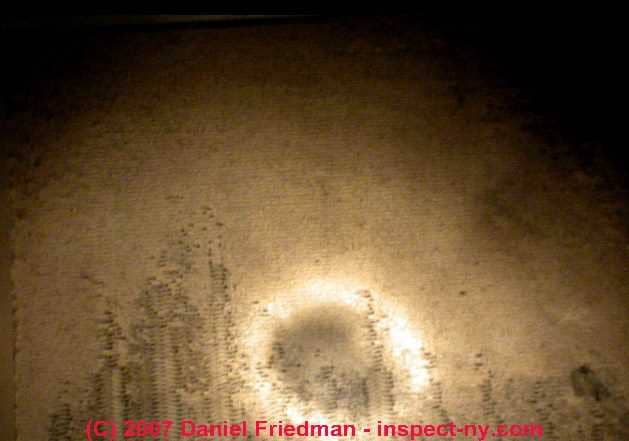
A number of readers have asked about the role of aluminum in or on buildings or the use of aluminum evaporator coils in air conditioning and heat pump air handlers as an odor source.
We discuss aluminum siding, windows, and other building components, with a special interest in odors traced to siding, windows, or HVAC coils made of aluminum.
Photo: a very dirty cooling coil in an air conditioning air handler can host mold, bacteria, and other odor-causing biological growth.
[Click to enlarge any image]
In fact, a variety of common building products, coatings, and furnishings may exude odors that disturb at least some occupants, but clean aluminum itself isn't likely to be the culprit.
Most of these "aluminum odor" complaints are traced either to coating on aluminum products or contaminants on those surfaces.
But odor sources in buildings can be tricky to track down.
We provide some suggestions for tracking down these odor sources in buildings, and we offer suggestions for removing or curing these odors.
Aluminum siding, window or screen odors:
We've investigated a number of reports of strange odors in residential buildings that were ultimately traced to vinyl or plastic coatings on windows or siding or trim and that were outgassing.
On new materials, usually these odors dissipate within months of new construction or new installation.
A key diagnostic step in finding odor source was the observation that the odors were strongest when the material under investigation was exposed to sunlight or other sources of heat.
Some Common Aluminum Products that May Have a Role in Odors
- Aluminum air conditioner or heat pump evaporator or "cooling" coils
in the air handler, especially when contaminated with house dust and biological growth - (see photo above on this page)
See details
at at DIRTY HVAC COIL CLEANING PROCEDURES
- Aluminum foil covered building insulation products - (see photo above of mold and water stains in foil faced fiberglass insulation in an HVAC air handler)
mold or other contamination in the insulation itself may be an odor source, especially if the insulation has been wet
- Aluminum HVAC ducts - (photo above)
may host biological contaminants such as mold, especially if the duct interior or air handler interior have been wet; try having the ductwork cleaned by a professional and double-check that there are no water leaks into the duct system
See WET CORRODED DUCT WORK - Aluminum siding or trim or window paints or coatings
in certain product batches by some manufacturers may exude a plastic odor, especially when new or when exposed to heat or sunlight.
See also
PLASTIC ODORS-SCREENS, SIDING. - Chemical cleaners used on aluminum surfaces
can result in odor offgassing.
Watch out: Don't use acidic cleaners on aluminum HVAC coils. You may corrode the coil, leading to refrigerant leaks and a need for costly replacement of the evaporator coil .
An example, using hydrogen peroxide to clean an AC Cooling coil is given
at the same DIRTY COIL CLEANING PROCEDURES article cited just above. - Window or door screens
sometimes smell, especially when new or when heated. But if your are sure that your window or door screen is aluminum and you identify it as an odor source, you should first try cleaning the screen - else replace it.
Aluminum-Odor Diagnosis Strategies:
You can start tracking down the cause or source of an odor in one or more of several ways:
- ODOR DIAGNOSIS SIX STEPS - taking an orderly approach to odor source tracking
- ODOR DIAGNOSIS CHECKLIST - an easy checklist of stuff to examine or test
- ODORS GASES SMELLS, DIAGNOSIS & CURE - includes a catalog of places to look when tracking down an odor source
- SMELL PATCH TEST to FIND ODOR SOURCE - procedure for testing specific surfaces or items to see if an odor source of if they have absorbed and are re-emitting an odor
Research on Aluminum Building Component or HVAC Coil Off-Gassing & Odors in Buildings
- Bjorkroth, M., O. Seppanen, and A. Torkki. "Components of the air handling unit and air quality." In Proceedings of Healthy Buildings, vol. 97, no. 1, pp. 599-603. 1997.
- Fromme, H., A. Mattulat, T. Lahrz, and H. Rüden. "Occurrence of organotin compounds in house dust in Berlin (Germany)." Chemosphere 58, no. 10 (2005): 1377-1383.
- Hipchen, John C., Annina Hogan, and Dale Powell. "Comparison Study of Bio-Growth in Commercial AHU’s Using Copper Heat Exchangers and Components." (2018).
- Kerka, William F., and Elmer R. Kaiser. AN EVALUATION OF ENVIRONMENTAL ODORS [PDF]ournal of the Air Pollution Control Association 7, no. 4 (1958): 297-301.
- Peng, Chiung-Yu, Cheng-Hang Lan, and Tzong-Jer Wu. "Investigation of indoor chemical pollutants and perceived odor in an area with complaints of unpleasant odors." Building and Environment 44, no. 10 (2009): 2106-2113.
- Schmidt, Michael G., Hubert H. Attaway, Silva Terzieva, Anna Marshall, Lisa L. Steed, Deborah Salzberg, Hameed A. Hamoodi, Jamil A. Khan, Charles E. Feigley, and Harold Michels. "Characterization and control of the microbial community affiliated with copper or aluminum heat exchangers of HVAC systems." Current microbiology 65, no. 2 (2012): 141-149.
- Siegel, Jeffrey, and Ian Walker. DEPOSITION OF BIOLOGICAL AEROSOLS ON HVAC HEAT EXCHANGERS [PDF] No. LBNL-47669. Lawrence Berkeley National Lab.(LBNL), Berkeley, CA (United States), 2001.
Field Reports: Sources of & Cures for Aluminum-Related Odors In or Around Buildings
Report of Aluminum smell from Trane air conditioning unit
@danjoefriedman, You say that aluminum will not smell I hate to contradict you recently had a train air-conditioning unit giving off a horrible smell cleaned several times turned out it was the aluminum coil growing bacteria so aluminum will not smell but it’s a great breeding ground for bacteria that does train under warranty
Apoxsee coated the coil no more problem - On 2022-11-13 by Richard
Reply by InspectApedia (Editor) (mod) - aluminum itself does not smell but it may host smelly contaminants especially on an HVAC coil
@Richard,
Thanks for the added comment. So actually we agree. Aluminum itself, such as that used as fins or fins and tubing on a HVAC coil, does not emit a noticeable odor, but certainly contaminants that collect on the coil can smell horribly (and may corrode the aluminum as well).
The smell is from the contaminants, not the metal.
In HVAC systems there have been decades of research on these problems, including experiments with making heat exchangers or HVAC coils intended to resist microbial growth. Coils in particular are exposed to dampness or even water from condensation that, combined with the naturally-occurring microbials in house dust (skin cells, bacteria, mold) are at risk of becoming a fertile breeding ground and smell source.
But do not blame the aluminum coil. In fact for decades it's been known that aluminum is one of the more odor-resistant metals for use in HVAC systems. (Kerka 1958)
Supporting research is given above on this page.
Dirty Window Fan gives off B.O. Smell
My friend gave me an expandable window double fan he has had well over 10 years. it was caked with dirt and grim but I pulled it in to see if it works.
The overwhelming smell of strong body oder almost knocked me out. I've taken the fan apart and there is a off white greyish crusty material by the wiring and around the sides of entire fan.
Including the air slots on both sides. I've sprayed, scrubbed, soaked this thing and it hasn't let up. Not even a little bit .please help cause I'm broke and it's hot outside. On 2022-06-21 by Kalyn -
Reply by InspectApedia (mod) - Try a smell test: where, really, is the odor coming-from?
@Kalyn,
Try a smell test: where, really, is the odor coming-from?
Fan cage or enclosure
Fan blades
Fan wiring
Fan motor
somewhere else.
We use different approaches for different fan parts. We clean hard surfaces that can be cleaned, and we replace soft materials like insulation that can't be cleaned.
Watch out: wetting or scrubbing an electric fan motor may result in damage to internal insulation parts in the motor such as insulation on motor windings. If you've done that the motor is destroyed.
Repiort of chemical odor from old aluminum sliding doors
We have old aluminum sliding doors and they are emanating a slight chemical smell. Especially on hot days. Is this something I should be worried about? Is it harmful?- On 2021-02-14
by Amanda
-
Reply by (mod) - Aluminum is actually not a material that will emit an odor unless ...
Amanda
Aluminum is actually not a material that will emit an odor itself but the odor could be from a paint coating or from something it has spilled on the aluminum.So if there's an odor that's bothering you I would look a little further to see what the possible Source might be such as a new sealant that has been applied somewhere or even an animal that has crawled into an opening or died somewhere nearby.
What cleaning product should we use to clean our aluminum coil in the air handler?
Thank you, Dan. Do you have a cleaning product you recommend (or suggest avoiding) to clean the coils, air handler, and blower?
And how long does that product tend to linger in the air after use? (I assume the smell will get dispersed throughout the house and I'm very sensitive to VOC's.)
We use a really good media filter and change it frequently, but will do so now. And we'll have our ducts inspected as per your suggestion. (We had them cleaned when we bought the house a couple of yrs ago and they were in very good shape at that time, but that was before we bought the new A/C and started having this problem so that's kind of moot.)
As far as a more thorough inspection of the air handler and ductwork, would you suggest using a duct cleaning company (we have a very reputable resource for that) or should we involve a mold inspector to coordinate w/a duct cleaning company and/or the HVAC technician? On 2020-10-02 by Anonymous -
Reply by (mod) -
Take a look at DIRTY HVAC COIL CLEANING PROCEDURES
and you'll find a detailed discussion of using, buying and sources of A/C coil cleaners.Followup by Anonymous - we cleaned our coil and ducts but they smell
Thank you. Just to be clear, on all inspections of our HVAC system, including the one we had this week, we've been told our system is not only clean, but incredibly clean: the coils, the fan, etc, everything.
And, as noted, we had the ducts cleaned a little less than 2 yrs ago and were told they were quite clean at the get go. Knowing that, would you change or re-prioritize your recommendation.
Reply by (mod):
I'd spend some energy tracking down the odor source more-accuratrely, usign our smell test patch procedure on various surfaces that are suspect.
Oxidation on aluminum HVAC coil smells like damp cardboard or a sweaty locker room
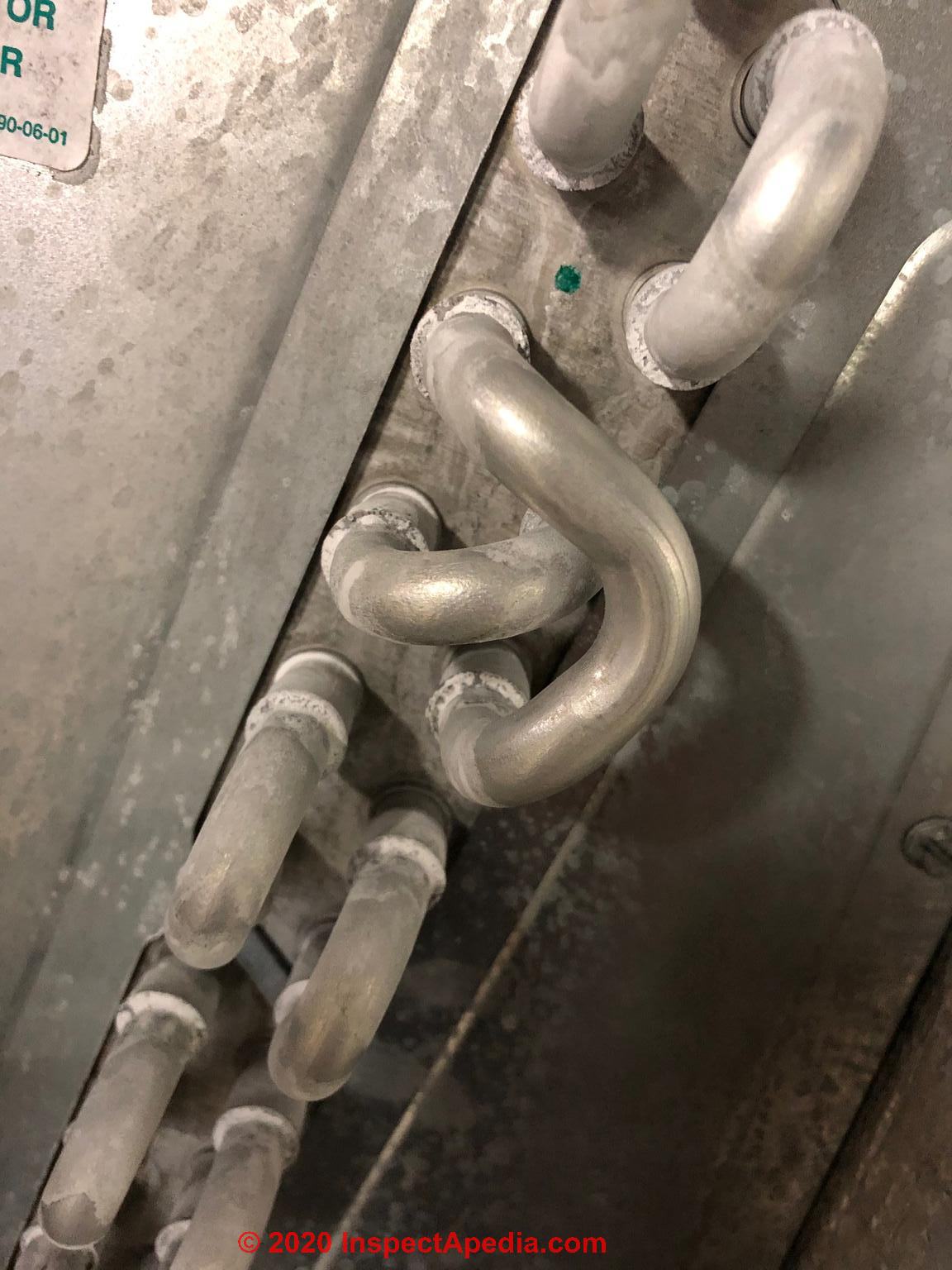 For the second year in a row at this time of year during the season transition when we switch back and forth btwn A/C, nothing, and heat, the A/C smells when it comes on after it’s been off for a day or so.
For the second year in a row at this time of year during the season transition when we switch back and forth btwn A/C, nothing, and heat, the A/C smells when it comes on after it’s been off for a day or so.
To me it smells like a sweaty locker room, most others say it smells like damp cardboard. The smell is immediate and throughout the house rather than local to any one register/duct.
Last year our HVAC people couldn’t figure out the source, nor could our IAQ person. Of note, the A/C is new (purchased 2 yrs ago – new coils and compressor).
When starting the A/C up again after the winter, the smell is not there so we assume that whatever is causing it has dried out from the heat running.
This week, an HVAC tech came out to do the seasonal check and said the source of the smell was “dust” on the coils and in the pan. He pointed to white flakey discolorations, particularly at the joints of the coils. I asked if it was mold and he said no, while acknowledging he’s not a mold expert.
My husband recalls the tech also said the dust isn’t from the environment that got stuck on the coils and drain pan as a result of air flowing through the system, but rather that it’s actually aluminum oxide (the tech didn’t call it that specifically) that was the result of an interaction between a new/fresh aluminum surface and moisture.
The tech said he often sees this on recently installed systems and that it stabilizes over time. He identified the dust/oxide as the potential source of the odor when it becomes wet.
He pointed out where it had built up on the tubes interconnecting the coils and particularly heavy at the joints where there was solder. There was also quite a bit of the white, flaky material in the channels that drain the pan.
My husband researched aluminum oxide and the whole story makes chemical sense to him, the weakest point being the hypothesis that it is the origin of the smell. But it could be.
Our questions for you are:
(1) Does this sound like a reasonable explanation for the odor?
(2) From the photo I’m attaching, can you tell if the stuff is metallic oxide (crystalline) or something else, like mold? - On 2020-10-01
by Anonymous -
Reply by (mod) - Locker room smell is mold, not aluminum oxide
I'd agree that the conditions that caused formation of a coating of oxidized aluminum on the cooling coil include moisture that might have also wet nearby materials that in turn could smell, for example causing moldy insulation or mold growth on nearby paper or cardboard barriers found in some equipment.
And for sure there are some molds that can smell like dirty socks or a "locker room" smell.
But aluminum oxide itself would not smell like a locker room or dirty socks.
Best would be to have a more thorough inspection of the air handler and ductwork;
It seems odd to me that switching between A/C and Heat would produce and odor that we could trace to "dust on the coils" because the system's air flow is passing through the coil (condensing coil or cooling coil) whenever the blower operates.I agree that moisture on the coil or elsewhere in the system will be greater when in cooling mode and that may, in turn, be producing or stimulating mold contamination;
I've not found an authority that says aluminum oxide smells like a locker room; but there are some molds that are so characterized.
Have the coil cleaned and the air handler and the blower fan itself cleaned; install a fresh air filter; inspect ALL of the ductwork;Watch out: there are indeed some indoor mold contaminants that smell like "sweaty gym socks".
Plastic smell coming off our storm windows made of aluminum and glass.
Please let me know who I can contact in my town government to help us figure out the plastic smell coming off our storm windows made of aluminum and glass.
There is no plastic or vinyl in them. On 2013-01-29 by Rema Smith, rema.smith@cox.net -
Reply by (mod) - smell coming off windows made of aluminum and glass.
Rema
Sorry to say that your town government is not likely to offer help in tracking down the cause and recommending a cure for odors blamed on aluminum storm windows.
You will want to find a local environmental test consultant or possibly even an experienced home inspector to help you understand the odor problem and recommend a cure.
...
...
Continue reading at ODORS in AIR HANDLERS & DUCT WORK or select a topic from the closely-related articles below, or see the complete ARTICLE INDEX.
Or see these
Recommended Articles
- ALUMINUM WIRING HAZARDS & REPAIRS - home
- DIRTY HVAC COIL CLEANING PROCEDURES - clean the mold or biological contaminants from the coil to reduce odors
- DUCTWORK CONTAMINATION
- Legionella BACTERIA & HVAC Equipment
- ODORS GASES SMELLS, DIAGNOSIS & CURE - home
- ALUMINUM BUILDING MATERIAL ODORS
- CHEMICAL ODOR SOURCES - checklist for tracking down chemical odors to their source
- ODORS in AIR HANDLERS & DUCT WORK
- ODOR DIAGNOSIS CHECKLIST, PROCEDURE
- ODOR DIAGNOSIS SIX STEPS
- ODOR EVENT LOG & CHECKLIST FORM [PDF] - Use this form to collect data to help track an odor to its source
- ODOR EVENT / SOURCE LOCALIZATION LOG
- ODOR REMOVING DETERGENTS
- ODOR SENSITIVITIY VARIES by PERSON
- SMELL PATCH TEST to FIND ODOR SOURCE
- VINYL SIDING or WINDOW PLASTIC ODORS
- VOCs VOLATILE ORGANIC COMPOUNDS
- SMELL PATCH TEST to FIND ODOR SOURCE
- WINDOW OFFGASSING ODOR COMPLAINTS, FIBERGLASS & VINYL
Suggested citation for this web page
ALUMINUM BUILDING MATERIAL ODORS at InspectApedia.com - online encyclopedia of building & environmental inspection, testing, diagnosis, repair, & problem prevention advice.
Or see this
INDEX to RELATED ARTICLES: ARTICLE INDEX to BUILDING ODOR DIAGNOSIS & CURE
Or use the SEARCH BOX found below to Ask a Question or Search InspectApedia
Ask a Question or Search InspectApedia
Questions & answers on how to find and cure sources of plastic odors at building exteriors or interiors.
Try the search box just below, or if you prefer, post a question or comment in the Comments box below and we will respond promptly.
Search the InspectApedia website
Note: appearance of your Comment below may be delayed: if your comment contains an image, photograph, web link, or text that looks to the software as if it might be a web link, your posting will appear after it has been approved by a moderator. Apologies for the delay.
Only one image can be added per comment but you can post as many comments, and therefore images, as you like.
You will not receive a notification when a response to your question has been posted.
Please bookmark this page to make it easy for you to check back for our response.
IF above you see "Comment Form is loading comments..." then COMMENT BOX - countable.ca / bawkbox.com IS NOT WORKING.
In any case you are welcome to send an email directly to us at InspectApedia.com at editor@inspectApedia.com
We'll reply to you directly. Please help us help you by noting, in your email, the URL of the InspectApedia page where you wanted to comment.
Citations & References
In addition to any citations in the article above, a full list is available on request.
- [4] American Conference of Governmental Industrial Hygienists (ACGIH). 1999 TLVs and BEIs. Threshold Limit Values for Chemical Substances and Physical Agents, Biological Exposure Indices. Cincinnati, OH. 1999.
- In addition to citations & references found in this article, see the research citations given at the end of the related articles found at our suggested
CONTINUE READING or RECOMMENDED ARTICLES.
- Carson, Dunlop & Associates Ltd., 120 Carlton Street Suite 407, Toronto ON M5A 4K2. Tel: (416) 964-9415 1-800-268-7070 Email: info@carsondunlop.com. Alan Carson is a past president of ASHI, the American Society of Home Inspectors.
Thanks to Alan Carson and Bob Dunlop, for permission for InspectAPedia to use text excerpts from The HOME REFERENCE BOOK - the Encyclopedia of Homes and to use illustrations from The ILLUSTRATED HOME .
Carson Dunlop Associates provides extensive home inspection education and report writing material. In gratitude we provide links to tsome Carson Dunlop Associates products and services.


